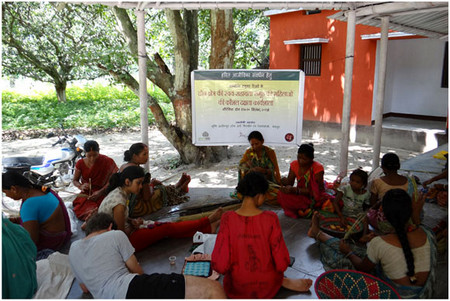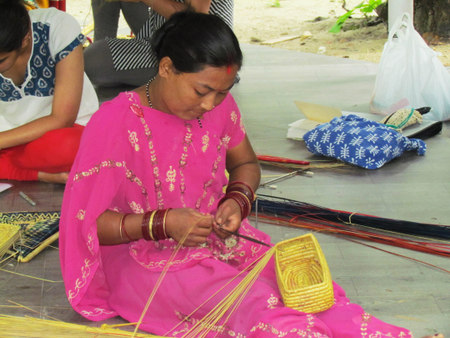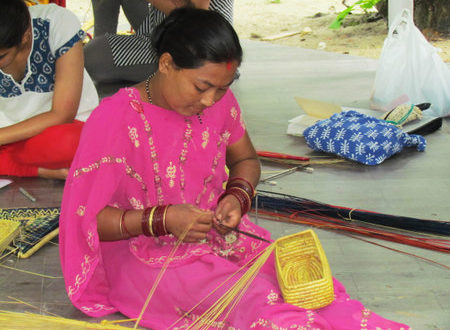Tharu women undergo training to adopt green livelihoods
Naurangia, Doan Valley, September 28 2014: For the first time in their lives, 26 Tharu tribal women living in remote villages in the sylvan settings of Doan Valley in north Bihar learnt about the potential of earning a decent livelihood using their traditional skills. A 12 day training workshop organized by Wildlife Trust of India (WTI) and Valmiki Tiger Reserve (VTR) in collaboration with the Bangalore based Srishti Institute of Art, Design and Technology took 26 women selected from 53 Self Help Groups under its wing to develop new products in woven grass using their traditional skills and locally available material.
“The new initiative would not only give a new dimension to the Tharu art and culture by taking it beyond its geographical boundary but also help in generating income for the community, which will ultimately reduce villagers’ dependency on the tiger reserve,” asserts Santosh Tewari, Field Director, VTR.

26 women selected from 53 Self Help Groups developed new products in woven grass using their
traditional skills and locally available material in the workshop. Photo: Subrat K Behera / WTI
Tharus inhabit the Himalayan foothills around Valmiki forests in Bihar. They worship various divine incarnations of goddesses, a.k.a Devi and give their women a position of power in society. Traditionally dependent on natural resources to earn livelihoods and sustenance, and preserving their cultural identity, Tharu families pass on their token of love, care and blessings to brides in the form of baskets, lovingly woven by womenfolk using locally available Moonj (Saccharum munja) and Kharai (Saccharum spontaneum) grasses. They believe that the bigger and stronger the basket filled with paddy that the society presents to the bride, the more prosperity she would get in her wedded life. The baskets mostly in vibrant red, green and blue colors are the cultural identity the tribe and all tharu women are proficient weavers, passing this skill down to younger generations.
“The idea of marketing these woven wonders sprung from the concept of green livelihoods and Rainbow products that emanate from WTI’s projects”, said Rupa Gandhi, Chief of Social Entrepreneurship division of WTI that was recently launched under the name Nature India. “The women are very adept at weaving grass, but they needed to think differently in order to create items that could find an urban market, and realise their potential to earn a decent living. So we decided to hold a workshop to train them.” Their products fit WTI’s definition of Rainbow products in that they are friendly to the environment, gender, cultural heritage, wildlife conservation and animal welfare, fair trade, equitable and just.
“The seasonal calendar of 53 women self-help groups in Doan Valley reflected that women had substantial free time, which could be used in income generating activities through organized vocations using their traditional skill, and the project on Green Livelihood was conceptualized,” explained Samir Kumar Sinha, Regional Head of WTI in Bihar. There are 25 villages in Doan valley with a population around 18000 and WTI is implementing livelihood improvement and forest dependency reduction measures in seven villages at present.

Vibrant and colourful, the baskets are lovingly woven by womenfolk using locally available Moonj and Kharai grasses. Photo: Dr Samir K Sinha / WTI
Naga Nadini, Head of Product & Interface Design of the Srishti Institute and the team leader is enthused that this fine grass weaving skill of Tharu women will have an edge over the available grass handicrafts in regional and national markets. “Before conducting the workshop, the team took a stock of grass products currently available in markets and assessed buyers’ demand,” reveals Shipra Koyal, a designer who is experimenting on embroidery using Moonj threads.
Panmati Devi, an artisan from Gardi village was trained on knitting the Moonj thread and producing clutch bags in different organic shapes. “It is unbelievable for me that our traditional art can produce such a wide range of products”. “The workshop has helped us think beyond our baskets,” said Jeet Kumari Devi an artisan from Majuraha village.
The workshop came up with new grass products, such as toys, lunch boxes, lampshades, bedroom slippers, a range of fruit baskets, coasters, casserole cases, small furniture, insulation cases for tiffin boxes, laptop and i-pad cases, to name a few. Keep following us and watch this space for updates on when these products would hit the market through Nature India.









